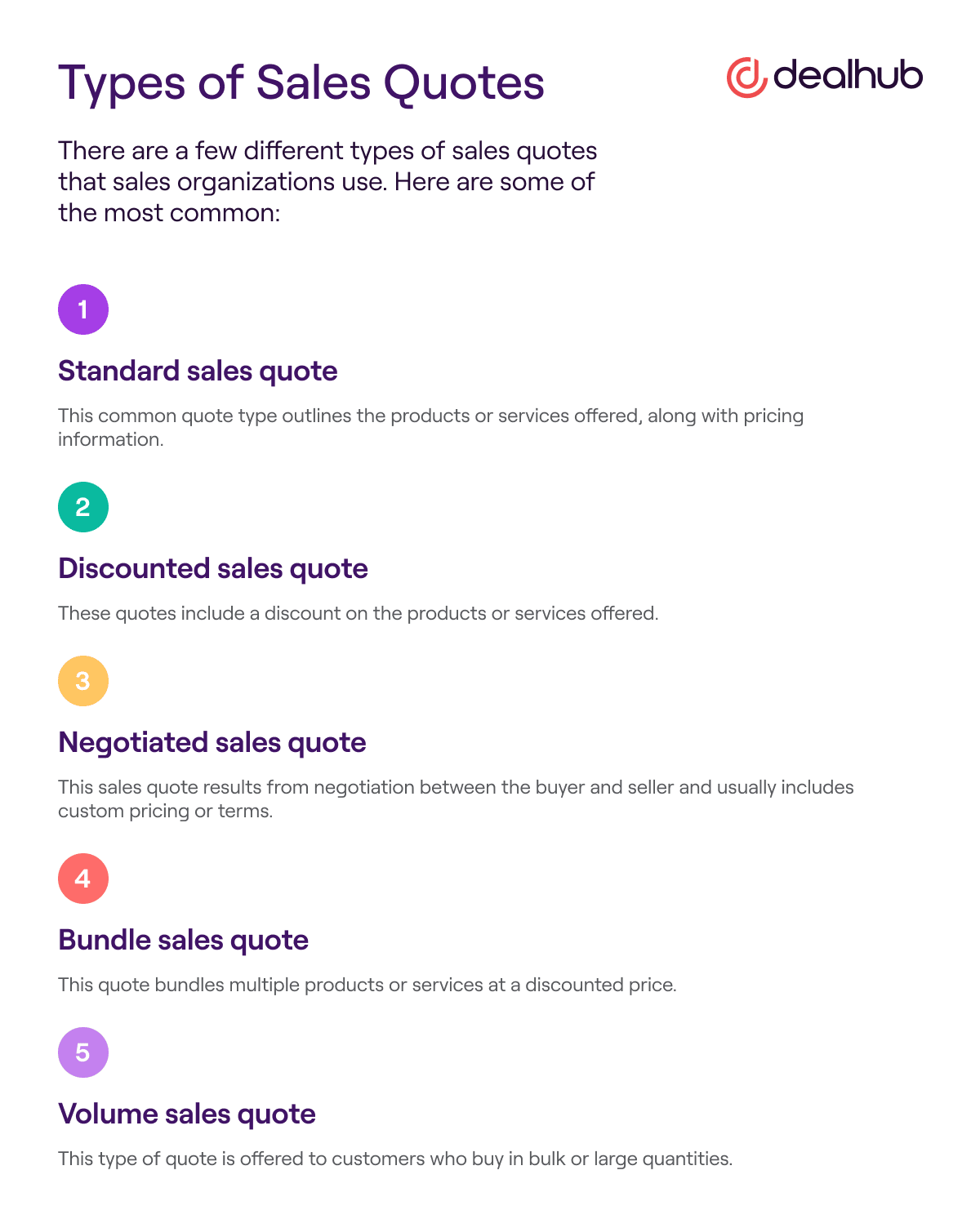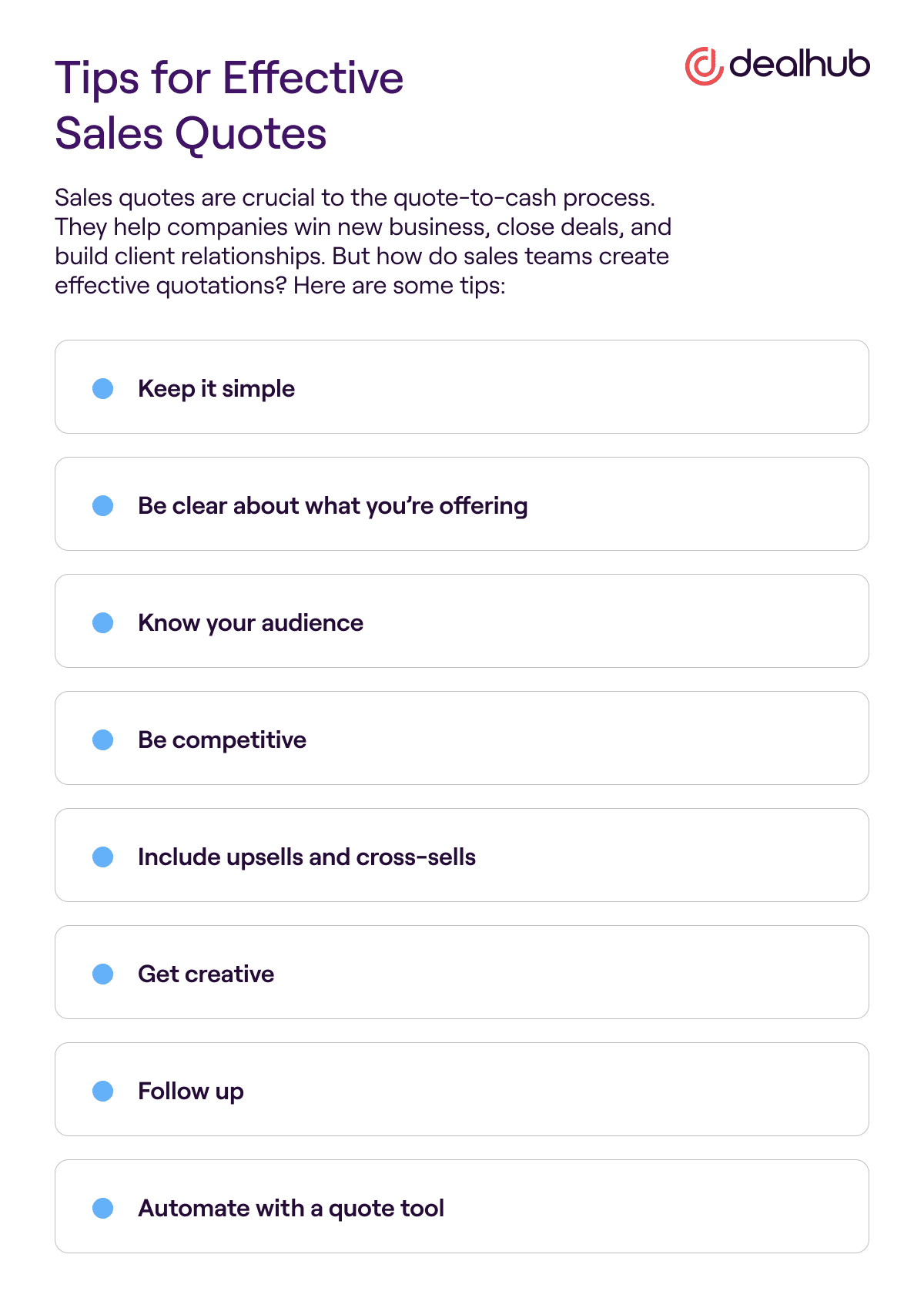Sales Quote
Table of Contents
What is a Sales Quote?
In business, a sales quote, also known as a sales quotation or price quote, is an offer from a seller to a potential buyer outlining the price and terms of a proposed sale.
A sales quote can be used in business-to-business (B2B) and business-to-consumer (B2C) transactions.
In a B2B transaction, a sales quote is often the first step in the sales process. It gives potential buyers an idea of the price and gauges their interest in purchasing a product or service. If the buyer is interested, they usually ask for a formal proposal.
In a B2C transaction, a sales quotation is usually the final step in the sales process. The buyer has already decided they want to purchase the product or service, and they’re simply requesting a written price quote so they can compare it to other offers.
Synonyms
- Quote
- Sales quotation
- Price quote
Understanding Quotes in Business
A sales quote is a formal document that outlines the price of a specific product or service for a potential customer. In business, it’s a price estimate that helps set expectations before a purchase is made.
Key points about quotes in business:
- Purpose: Quotes are used to communicate the cost of goods or services to a customer. This allows the customer to decide if the price aligns with their budget and compare it to offers from other businesses.
- Not a binding agreement: Unlike a contract, a quote typically isn’t legally binding. This means the customer can choose not to move forward after receiving a quote, and the business can potentially adjust the price later on (with limitations). However, a quote can be part of the contracting process and can be used to create a contract that is signed and, therefore, legally binding.
- Categories of quotes: There are two main categories of quotes: estimates and detailed breakdowns. Estimates are used when the exact cost is variable due to factors like project duration or material prices. Detailed breakdowns provide a more precise cost for products or services with fixed prices.
- Importance: Quotes play a crucial role in the sales process. They help businesses present their offerings competitively and professionally, and can increase the chances of closing a deal.
Types of Sales Quotes
There are a few different types of sales quotes that business organizations use. Here are some of the most common:
- Standard sales quote.
This common quote type outlines the products or services offered, along with pricing information. - Discounted sales quote.
These quotes include a discount on the products or services offered. - Negotiated sales quote.
This sales quote results from negotiation between the buyer and seller and usually includes custom pricing or terms. - Bundle sales quote.
This quote bundles multiple products or services at a discounted price. - Volume sales quote.
This type of quote is offered to customers who buy in bulk or large quantities.

What Should a Sales Quote Include?
When a salesperson creates a quote for a potential customer, it is important to include all necessary information to ensure a smooth transaction and no misunderstandings between the buyer and seller. This will help the customer understand exactly what they are getting and give them a clear picture of the costs involved.
A sales quotation typically includes:
- The seller’s name and contact information
- The date the quote is valid until
- A list of the products or services being offered
- The price of each product or service
- Any discounts or special offers
- The total cost of the sale
- Payment terms
- The seller’s signature
Tips for Effective Sales Quotes
Sales quotes are crucial to the quote-to-cash process. They help companies win new business, close deals, and build client relationships. But how do sales teams create effective quotations? Here are some tips:
- Keep it simple: A quote should be easy to understand. Avoid using jargon or technical terms that your client may not be familiar with.
- Be clear about what you’re offering: Make sure the quote includes a detailed product or service description. The customer should know exactly what they’re getting for their money.
- Know your audience: Personalizing sales quotes to buyers’ needs is essential. Salespeople can win more deals by researching their client’s needs and crafting customized quotes.
- Be competitive: Potential customers use quotes to compare vendors, so companies should consider competitors’ pricing when creating their price lists.
- Include upsells and cross-sells: Upsells and cross-sells extend the value of the deal.
- Get creative: Creativity with images, graphics, and videos makes sales quotes more engaging.
- Follow up: Once a sales rep has sent a quote, they should follow up with the buyer to ensure they’ve received it and understand what you’re offering.
- Automate with a quote tool: Automated sales quotes are more accurate than manually created ones. Additionally, they are easier and faster to create which helps sales reps respond quickly to prospective customers.

Why Automate the Sales Quotation Process?
Sales quotation automation can help businesses streamline their sales processes and improve accuracy. By automating the creation and management of sales quotations with Configure Price Quote software (CPQ), businesses can reduce the time and effort required to generate error-free quotes for customers.
Another advantage of using quotation software to automate the quoting process is that it has built-in approval workflows, reducing approval time and enabling sales teams to send quotes more quickly. In addition, automated quoting tools can provide real-time visibility into the status of quotes, so you can track progress and ensure timely follow-up.
Automated sales quotation systems also help sales operations teams ensure that quotes are always up-to-date and compliant with company pricing policies.
This is especially beneficial in companies with complex pricing and product configurations. Additionally, automated sales quotation systems can help businesses keep track of customer interactions and manage customer information more effectively.
Finally, sales quote automation helps businesses improve customer service by providing instant access to accurate quotes, making it easier to compare prices and make purchasing decisions.
Overall, automating the sales quotation process can help businesses save time and money while also improving customer service which is essential to revenue operations.
How CPQ Helps SaaS Sales Teams Generate Accurate Quotes
CPQ software is invaluable for SaaS sales teams when generating accurate quotes. Here’s how it streamlines the process:
1. Guided Selling and Product Configuration:
CPQ software guides sales reps through the quote creation process. Imagine a conversation with a client about your marketing automation platform. The CPQ system might prompt the rep to inquire about the client’s company size, number of users, and desired features. Based on their answers, the software suggests the most suitable subscription tier and add-on features, ensuring the quote reflects the client’s specific needs.
2. Automated Pricing Rules:
Sales teams no longer rely on spreadsheets. CPQ software automates complex pricing rules for SaaS products. This includes factors like:
- Subscription Tiers: The software automatically applies the correct pricing based on the chosen tier, whether it’s a basic, pro, or enterprise plan.
- Volume Discounts: For larger clients, CPQ can automatically factor in pre-defined volume discounts based on the number of users or length of the subscription.
- Custom Pricing: The software can handle scenarios where some customization is needed. For instance, it might allow the rep to offer a specific discount on a specific feature.
3. Accurate SaaS Quote Generation:
With all the information gathered and pricing applied, CPQ software generates a professional and accurate quote. SaaS sales quotes typically include:
- Client Information: Company name, contact details.
- Product Summary: Clearly outlines the chosen subscription tier, add-on features, and any custom elements.
- Pricing Breakdown: A transparent table detailing the cost of each element, including any discounts applied.
- Total Price: The grand total for the entire solution.
- Terms and Conditions: Standard terms outlining the subscription agreement.
By automating these steps, CPQ software minimizes the risk of errors and ensures consistency in pricing across all quotes. Sales teams save time and build trust with potential customers by presenting a clear and accurate picture of the proposed solution.
People Also Ask
How do you write a sales quote?
Sales quotes are essential for any business that sells products or services. They give potential customers an estimate of what it will cost to purchase your goods or services. A well-written sales quote can help you win new business and close deals.
Here are some tips on how to write an effective quote:
1. Start by clearly stating the purpose of the quote.
2. Include all relevant information about the quoted product or service, such as a description, price, quantity, and delivery date.
3. Include any special terms or conditions that may apply to the sale.
4. Make sure the quote is easy to read and understand.
5. Include a call to action, such as a deadline for accepting the quote or instructions on how to place an order.
How does a sales quote work?
The purpose of a sales quote is to provide the buyer with an estimate of the total cost of the purchase, so that they can decide whether or not to proceed with the sale.
A sales quote is typically valid for a certain period of time, after which the price may change. If the buyer decides to purchase the goods or services, they will usually sign the sales quote to indicate their acceptance of the terms.
Once the sales quote is signed, it becomes a binding contract between the buyer and seller.
Sales quotes are often used in businesses-to-business (B2B) transactions, as well as in some retail situations.
In B2B sales, quotes are usually generated by the seller’s CRM, CPQ or ERP system.
These programs track a company’s interactions and customers’ interactions and can automatically generate quotes based on past purchase history and current pricing data.
Sales quotes are an important tool in the sales process, as they help to ensure that both the buyer and seller are aware of the price of the goods or services being purchased and that they have agreed to the terms of the sale.
What is the purpose of a sales quote?
Sales quotes are essential business documents that help buyers compare prices between different vendors and make informed purchase decisions.
Quotes also help sellers win new business by providing a professional, branded proposal they can send to potential customers that includes the necessary information the buyer needs to make a decision.
Is a sales quote the same as an invoice?
Many people use the terms sales quotes and invoices interchangeably, but there are some key differences.
A quote is an estimate of what a customer will be charged for a product or service, while an invoice is a request for payment for goods or services that have already been provided.
Why are SaaS sales quotes complex?
Within the realm of SaaS, quotes can range from simple license tiers to complex usage-based structures with service and product bundles. While some SaaS products offer straightforward subscriptions with limited customization, others cater to businesses with specific needs. Complex SaaS sales quotes address these intricate situations.
Imagine a marketing automation platform. A complex quote might outline a multi-year subscription with user tiers that scale based on the client’s growth projections. It could also factor in variable usage costs for features like email sends or API calls. Additionally, the quote might include one-time setup fees for custom integrations or data migration.
To navigate this complexity, the quote should provide a clear breakdown of costs associated with each element. This transparency builds trust and allows the client to understand the true value proposition. Similarly to a manufacturing quote for a highly customized product, a complex SaaS quote dives deeper into the specifics of the solution being offered.


